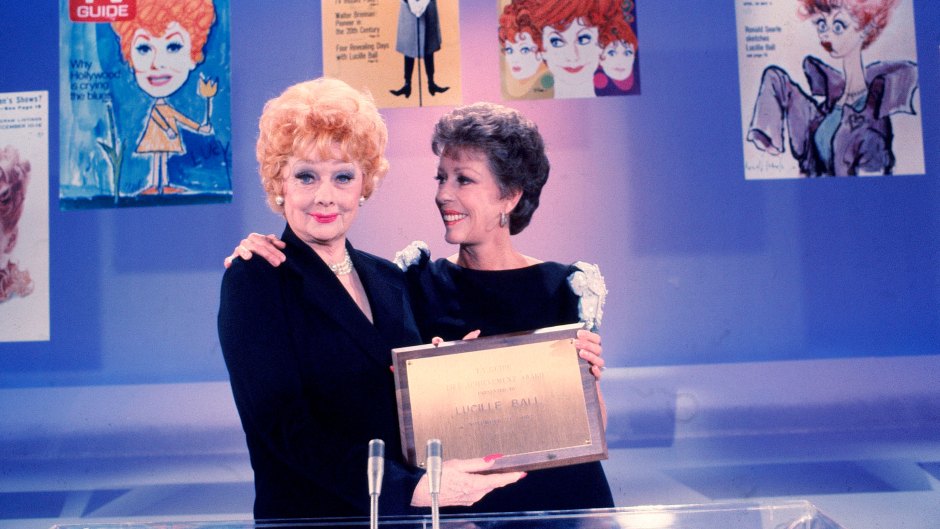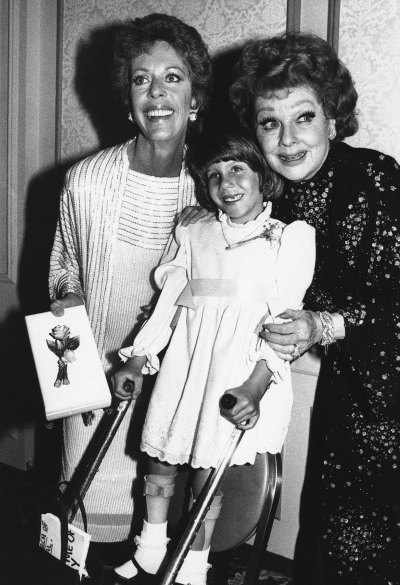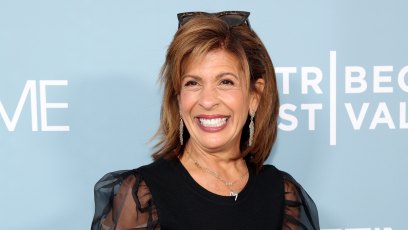
Nick Ut/AP/Shutterstock
Carol Burnett Viewed Lucille Ball Like a Big Sister: Inside Their Unique Hollywood Friendship
On the second night of her off-Broadway run as Princess Winnifred in Once Upon a Mattress, Carol Burnett peeked out through the curtain at the audience. In the second row sat a familiar-looking woman with flaming red hair. “I thought, ‘Oh my God, oh my God, it’s Lucille Ball,’” recalls Carol. “‘I don’t know if I can get through this evening.’”
After the show, Lucille paid a visit to Carol’s dressing room to say hello. “She was so supportive,” remembers Carol, who was just 25 at the time. “She called me ‘Kid.’ She said, ‘Kid, if you ever want anything or need me, give me a call,’ which was so sweet.”

That backstage meeting in 1959 became the genesis of a warm friendship between Carol and Lucille that lasted for the next 30 years. The women would appear in TV specials together, guest-star on each other’s shows and share private time out of the spotlight. Lucille even threw Carol’s baby shower when she was pregnant with her second daughter, Jody. “It was a black-tie baby shower. With men attending,” Carol says. “Her husband then was comedian Gary Morton, and he opened all the baby gifts and did routines on everything. It was just hysterical.”
Despite the 22 years that separated them, Lucille and Carol understood each other. Both were largely raised by strong women — Carol by her grandmother and Lucille by her widowed mother. Neither had money growing up. “On my mother’s side, they had nothing,” recalled Lucie Arnaz of her mom. Carol, meanwhile, spent her early years in an apartment so small, she used the bathroom shower curtain rod to hang her clothes. “It was not a pleasant childhood,” admits Carol, who like Lucille, used to escape to the movies.
Lucille spent two decades as a B-movie starlet before she broke out on I Love Lucy in 1951. Yet for all the accolades heaped upon her for the show, she always insisted that she was not naturally funny. “She’d say, ‘I’m an actress that specializes in comedy. I can make it funny, but I need something to work with,’” says Tom Watson, a staffer on 1986’s Life With Lucy.
Watching Carol on stage, Lucille immediately recognized the younger woman’s natural talent for comedy — and greatly admired it. “She had something that you couldn’t escape, you just knew that this girl had it,” said Lucille. “She does things that are crazy, but you believe them.”
Carol, meanwhile, had been a longtime fan of the redheaded star. “I always looked up to her,” she says, noting what a wonderful actress Lucille was. “When I first saw her on screen, I remember I didn’t like her at all. I was 9 years old, and the film was called The Big Street, and Lucy played this mean, heartless showgirl. I’ve seen the film since. I think it’s my favorite Lucy film, which is strange for me to say because she was not funny, but I think the film shows Lucy’s talent as a comedian is based on the fact that she’s a wonderful actress. She could do it all.”
Carol never planned to take Lucille up on her offer of career help. But in 1966, she called her. “I was doing really well, and CBS offered me an hour-long special if I could get a major guest star,” Carol recalls. “She got on the phone right away and said, ‘Hey, Kid, you’re doing great, what’s happening?’ I was so nervous. I was blubbering all over the place. I said, ‘Lucy, I know you’re busy. I’m gonna be doing a special…’ and she didn’t even let me finish. She said, ‘When do you want me?’”
The special, Carol + 2, which aired in 1966, would be the first time they worked together but not the last. Carol appeared on The Lucy Show and Here’s Lucy, while Lucille became a three-time guest star on The Carol Burnett Show.
At Desilu Studios in the 1960s, Lucille had broken ground as the first woman to run a major Hollywood production company. She confided what she learned about being the boss to her young protégée. “Lucy told me when she got a divorce, she had to do all the stuff that Desi [Arnaz] did, and the first table read on The Lucy Show stunk,” relates Carol. “She said to me, ‘Kid, that is when they put the S on the end of my last name.’”
When Carol guested on Lucille’s television series, she admired the respect Lucille commanded backstage. “She had to get tough because nobody would listen to ‘Crazy Little Lucy,’” explains Carol, who says she saw her friend as outspoken yet fair. “She never censored herself, [but she] was never picking on anybody. It was just the way she was, and they would lay their lives down for her.”
Carol says she could never be as tough as Lucille on The Carol Burnett Show but found her own way to get what she wanted. “I couldn’t do it like Lucy,” Carol says. “I would say, ‘I am not doing this right, can you help me out here?’”
Lucille liked to send flowers to Carol on her birthday. “Every year she’d say, ‘Happy birthday, Kid,’” recalls Carol, who was heartsick to hear of Lucille’s death from a heart rupture on April 26, 1989. “She died on my birthday. I remember getting up and seeing it on the morning shows, and it was out of the blue. She’d been sick, but they thought she was going to come home [from the hospital] and she died … That afternoon, the doorbell rang. There were flowers and a card saying, ‘Happy birthday, Kid.’”
In a business where performers often view each other as rivals instead of friends, Lucille and Carol forged a unique relationship that was as beautiful and timeless as their work. “I always looked up to her. I thought of her as my big sister,” says Carol. “She was really a special, special friend.”
— By Louise A. Barile
For more on this story, pick up the latest issue of Closer magazine, on newsstands now.









































